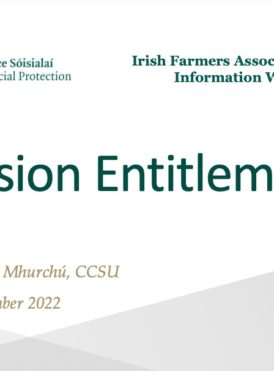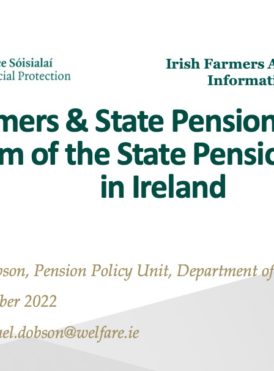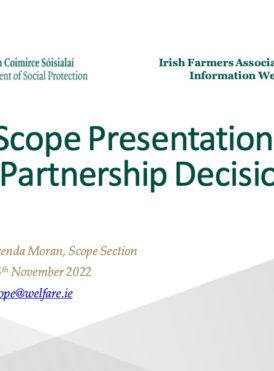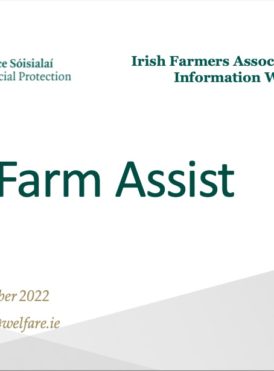Pensions & Retirement
Below is some introductory information on state pensions. Full information and information on your particular circumstances and situation should be sought from the Department of Social Protection. You can also contact Citizens Information for confidential advice and information.
Advice and information on private pension schemes is available from the Pensions Authority.
Department of Social Protection Information Webinar 2022
The Contributory State pension is a social insurance payment made when you reach 66 years. It is based on your Pay Related Social Insurance (PRSI) record – more information on PRSI is available here. This pension is not means tested.
Your personal rate is not affected by other income you may have, such as private pension etc. The pension is taxable but you are unlikely to pay tax if it is your only income.
What are the Contributory State pension rates?
The rates of payment are available here.
What are the qualifying criteria for the Contributory State pension?
To qualify an individual must:
- Be aged 66 or over.
- Have started paying PRSI contributions before reaching the age of 56 years.
- Have made at least 520 full rate PRSI contributions.
- Have a yearly average of 10 for a minimum pension and 48 for the maximum pension paid.
What are the PRSI contribution types for self-employed?
PRSI for the self-employed was introduced in 1988. All self-employed people aged between 16 years and 66 with earnings more than a specified amount (currently €5,000 per annum) must pay PRSI. The class of PRSI contribution paid by self-employed people is Class S.
If your income falls below the €5,000 limit and you are under 66 years, you may apply to make voluntary contributions. Payment of voluntary contributions can help maintain or improve your contributory pension entitlements. From April 2015, to qualify to make a voluntary contribution
you must:
- Have at least 520 weeks PRSI contributions paid under compulsory insurance in either employment or self-employment.
- Make a voluntary contribution within 12 months of the end of the year during which you have last paid compulsory insurance. If you were previously self-employed the voluntary contribution is €500.
How do I calculate my yearly average contributions?
There are two types of calculations for working out your average, the ‘normal’ and ‘alternative’. The latter only applies to people who reach pension age on or after 6 April 1992. For more information click here.
How can I find out the number of PRSI contributions I have made?
To request a copy of your PRSI contribution record contact: Central Records Department, Department of Social Protection, McCarter’s Road, Ardarvan, Buncrana, Co. Donegal or Locall 1890 690 690
I assist in the farm enterprise with my spouse/civil partner, but am not an employee or in a farm business partnership, so I do not have any PRSI contributions in my own right. Are there any steps I can take to qualify to make PRSI contributions?
Possibly. Certain spouses and civil partners of people who are self-employed are able to access social insurance by paying PRSI, to build up entitlement to social insurance benefits as a self-employed worker. Prior to 2014 these categories of spouses or civil partners were excluded from social insurance.
To qualify they must demonstrate:
- That she/he performs similar tasks as their self-employed spouse/civil partner; and
- That her/his income from all sources exceeds the minimum self-employed insurability threshold of €5,000. The income from her/his contribution to the farm must be shown as trading income or a share of the profits in the pay and file return made under Revenue’s self-assessment system of tax collection.
Can my spouse, civil partner or cohabitant get a Contributory State pension based on my record?
No, a person can only qualify for a Contributory State pension based on their own PRSI record.
However, if your spouse or civil partner does not qualify for a contributory pension in their own right, or qualifies for a lower rate, you can apply for an Increase for Qualified Adult on your pension. This increase is subject to a means test.
You will not get an increase if your spouse, civil partner or cohabitant:
- Has gross weekly earnings of more than €310.
- Is getting a higher rate social welfare payment in their own right (except Disablement pension,
Supplementary Welfare Allowance, Guardians Payment or Child Benefit).
If your spouse, civil partner or cohabitant has gross weekly means of €100 or less you will receive the full increase for them. If they have gross weekly earnings of between €100 and €300 you will get a reduced rate.
When and how do I apply for my Contributory State pension?
You should apply three months in advance of reaching the age of 66. Application forms are available from your local social welfare office, post office or Citizens Information Centre. If you need assistance call the Department of Social Protection on Local 1890 500 000. The completed application form should be returned to Social Welfare Services, College Road, Sligo.
If you do not claim within 6 months of becoming eligible, you could lose some payment.
The Non-Contributory State pension is a means-tested payment for people aged over 66 who do not qualify for a Contributory State pension or who only qualify for a reduced contributory pension based on their PRSI record. This pension is taxable but you are unlikely to pay tax if it is your only income.
What are the Non-Contributory State pension rates?
Find the current rates for the Non-Contributory State Pension
What are the qualifying criteria for the Non-Contributory State pension?
To qualify an individual must:
- Be aged 66 or over
- Pass a means test
- Meet the habitual residence condition (you are residing in Ireland and have a proven close link to the state).
What is assessed in the means tests?
Yours means is assessed under the following headings:
Cash income
- Any cash income you have is assessed in the means test, this includes income from a pension from another country.
- Your net income from farming or leasing is fully assessed with no disregards. The net income is worked out by deducting expenses incurred from the gross income. If you own land that is not productively used or leased this is assessed on its capital value.
- Earnings from employment up to €200 per week is not assessed.
Value of capital
Savings, investments, cash in hand and any property you own (excluding your home) is assessed as capital. All your capital from different sources is added together and a formula is used to find your weekly means from capital.
The formula for assessing means from capital is as follows:
First €20,000 – nil
Next €10,000 – €1 per €1,000
Next €10,000 – €2 per €1,000
Balance – €4 per €1,000
Income from property personally used
The value of the house you live in is not taken into account in the means test. However, any income (rent) you are getting maybe taken into account. There is an exception – if renting the room means that you are not living alone then your income from rent is not taken into account.
Your total means under the headings are added together to see what level of pension, if any, you can get. If you are one half of a couple (married couple, civil partners or a cohabiting couple of the same or opposite sex) then your means are taken to be half of the total means of you and your spouse, civil partner or cohabitant.
If you were getting Farm Assist and the different means test that applies to the non-contributory pension results in you getting a lower level of payment, you keep your entitlement to the higher amount for Farm Assist.
You must always contact the Department of Social Protection if there are any changes to your circumstances, as a change could mean an increase or decrease in payment. By contacting the Department, you will either get an increase faster or avoid repaying overpayments.
When and how do I apply for my Non-Contributory State pension?
You should apply three months in advance of reaching the age of 66. Application forms are available from your local social welfare office, post office or Citizens Information Centre. If you need assistance call the Department of Social Protection on Lo-call 1890 500 000. The completed application form should be returned to Social Welfare Services, College Road, Sligo.
If you do not claim within 6 months of becoming eligible, you could lose some payment.
Making PRSI contributions as an ‘assisting spouse’
Until 2014 spouses and civil partners of farmers who assisted in the farm enterprise but were not employees of the farm or in a farm partnership could not pay PRSI contributions and, therefore, could not build up PRSI entitlements.
From 2014, spouses and civil partners of farmers who assist their spouse/civil partner in the farm enterprise, but who are not employees of the farm or in a farm business partnership, can now qualify to make PRSI payments as a self-employed worker (PRSI Class S). Qualification to make these contributions applies only from 2014 onwards, and it will not be possible to make retrospective contributions.
This change will benefit those persons who were previously excluded from the Social Insurance system as a self-employed worker and who can, between now and turning 66, make sufficient contributions to bring them up to a minimum of 10 years of contributions, thereby qualifying for a contributory pension.
From 2014 onwards, in order to make PRSI contributions, the individual who assists their spouse/ civil partner on the farm must:
- Demonstrate that she/he performs similar tasks as their self-employed spouse/civil partner; and
- Demonstrate that his/her income from all sources exceeds the minimum self-employed insurability threshold of €5,000.
The income from his/her contribution to the farm must be shown as trading income or a share of the profits in the pay and file return made under Revenue’s self-assessment system of tax collection.
Where the person now qualifies, they are liable for PRSI at a rate of 4%, subject to a minimum payment of €500.
Read more on the Department of Social Protection Website.
Homemaker Scheme
The Homemaker’s Scheme makes it easier for a homemaker to qualify for the State Pension (Contributory).
A homemaker, for the purposes of the Homemaker’s Scheme (which was introduced from 6 April 1994), is a man or woman who provides full-time care for a child under age 12 or an ill or disabled person aged 12 or over.
Under the Homemaker’s Scheme any years that you spent as a homemaker (since 6 April 1994) are ignored or disregarded when working out your yearly average contributions for a State Pension (Contributory). To be eligible, you must:
- Permanently live in the State (except in cases where provisions under EU or posted worker regulations apply)
- Be aged under 66
- Have started insurable employment or self-employment on or after the age of 16 and before the age of 56
- Not work full-time, however, you can work and earn less than €38 gross per week
- Care full-time for a child under 12 or an ill or disabled person
A homemaking year is a year in which you are out of the workforce for the full tax year (only a full year can be disregarded). Up to a maximum of 20 homemaking years can be disregarded for State Pension (Contributory) purposes.
Homemaker’s credits can be awarded for part of a year at the start of the homemaking period, from the date you become a homemaker up to the end of the tax year. Likewise, homemaker’s credits can also be awarded for part of a year when the homemaking period ends, from the start of the tax year up to the date you stop homemaking.
For more information please see the Department of Social Protection’s website.
The Widow’s, Widower’s or Surviving Civil Partner’s Contributory Pension is a social insurance payment made to widows, widowers and surviving civil partners. It is based on the social insurance (PRSI) record of either the claimant or their late spouse or civil partner.
The pension is not means tested, so your rate of payment is not affected by other income you may have such as an occupational pension, earnings from employment, etc.
You qualify for Widow’s, Widower’s or Surviving Civil Partner’s Contributory Pension if you:
- are widowed or a surviving civil partner or
- are divorced from your late spouse (as recognised in this State) and have not remarried or
- have had your civil partnership with your late civil partner dissolved and have not registered in a new civil partnership and
- you are not cohabiting as a couple and
- you satisfy certain social insurance contribution conditions or
- your late spouse or civil partner got a certain rate State Pension (Transition) or a certain rate State Pension (Contributory) which included an increase for you as a Qualified Adult or would have included this increase but for the fact that you were getting a State Pension (Non-Contributory), a Blind Pension or Carer’s Allowance in your own right.
To qualify for Widow’s, Widower’s or Surviving Civil Partner’s Contributory Pension either you or your late spouse or civil partner must have:
a) 260 paid social insurance contributions paid to the date of death of the spouse/civil partner or before pension age (currently, age 66), whichever is earlier; and,
b) have a yearly average of either 39 paid or credited social insurance contributions in either the 3 or 5 years before death of the spouse/civil partner or before they reached pension age or at least 24 paid or credited social insurance contributions from the year of first entry into social insurance until either the year of death of the spouse/civil partner or the year they reached pension age, whichever is earlier.
In addition to your pension, you may qualify for some increases in pension payment based on your circumstances.
Increase for a Qualified Child (IQC)
If you have a child that normally lives with you that is aged under 18 or up to 22 in full time education who is being supported by you, you may qualify for IQC. You can no longer claim an IQC if your spouse, civil partner or cohabitant has an income of over €400 per week. You will get a half rate IQC if your spouse, civil partner or cohabitant earns between €310 and €400 a week. This only applies to a claim made after 6th July 2012. The full IQC rate is €29.80 and the half IQC rate is €14.90.
Living Alone Increase
If you are aged 66 or over and living alone, you are entitled to an additional €9 per week. To qualify for the increase, you must live completely alone. However, there are some exceptions if you:
- Live in an extension of a family member’s home, for example, in a granny flat, but can show that you have facilities to cook and eat alone. You must also have your own living/dining and sleeping accommodation.
- Are aged or infirm and have a friend or relative to stay for security reasons at night-time only.
The friend or relative must not contribute to the household financially. - Live alone during the day but stay with relatives or friends at night, or if you live alone during the week but have a relative to stay at the weekend.
- Live alone
Aged 80 Allowance
You automatically get paid an extra allowance of €10 per week when you reach 80 years of age.
This increase is not paid to qualified adults.
Fuel Allowance
The Fuel Allowance pays you an increase of €22.50 per week to help with the cost of heating your home during the winter months. There is only one Fuel Allowance payment per household.
It is a means-tested payment, which is linked to the maximum rate of the Contributory State pension. You are eligible for a Fuel Allowance if your assessable income limit is for a:
- Single person under 80 – €333.30 (€100 plus €233.30 i.e. max pension)
- Couple (where the qualified adult is under 66) – €488.80 (€100 plus €233.30 plus extra €155.50)
- Couple (where the qualified adult is 66 or over) is €542.30 (€100 plus €233.30 plus Extra €209)
If you are aged over 80, you get €32.50 per week.
Household Benefits Package
The package is available to everyone over 70 and to some people under 70 in certain circumstances. There are two allowances:
- Electricity/Gas allowance of €35 per month
- Free Television Licence allowance.
For full information on pension and other benefits see the Citizens Information Website.
Self-employed workers, including farmers, who cannot work due to long term illness or disability may be able to claim Invalidity Pension if they have made sufficient PRSI contributions. Invalidity Pension is paid as long as the person continues to satisfy the qualifying conditions.
Full information is available on the Department of Social Protection website




